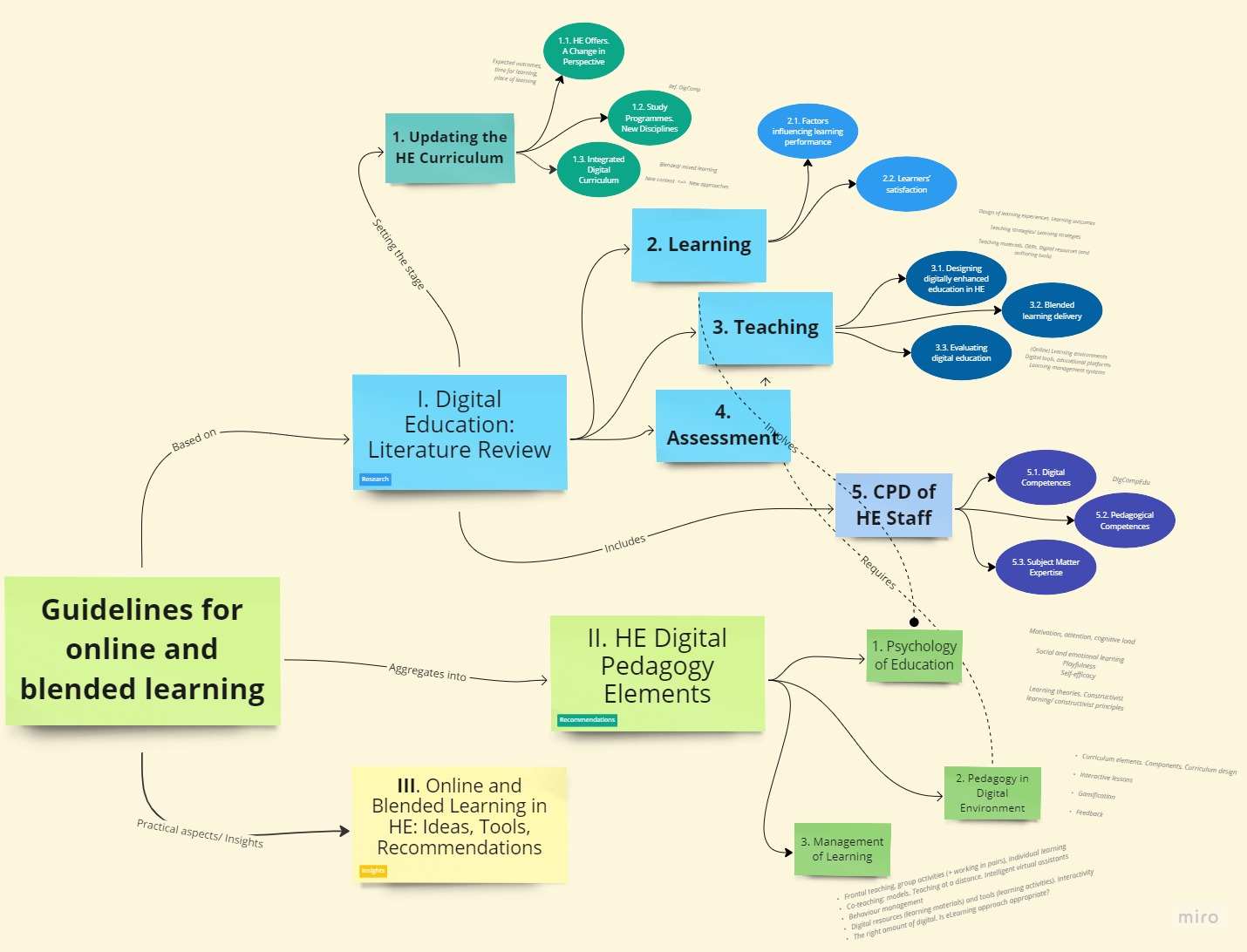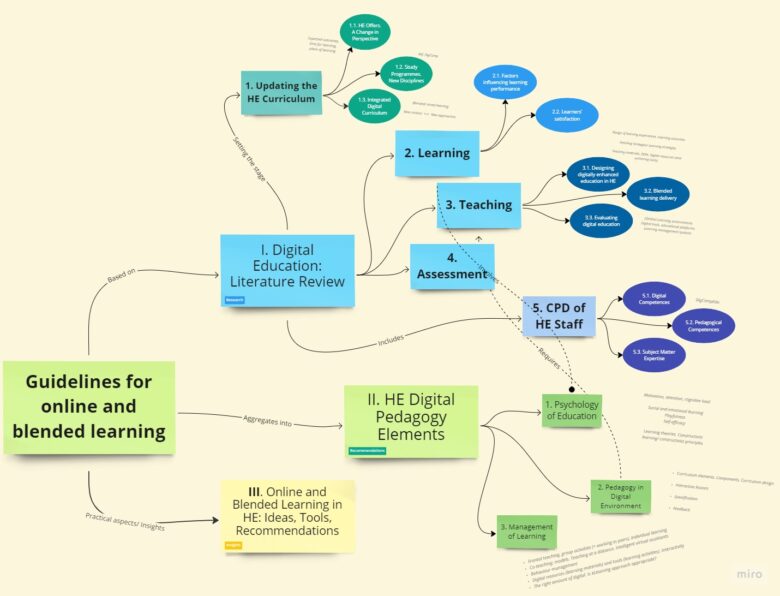As long foreseen, digital technologies are bringing significant changes in education. Two recent extraordinary events have brought a new perspective on the potential of new technologies, accelerating the education practices, the thinking about the necessary innovation, also bringing more pressure from society, beneficiaries, education decision makers – the pandemics and the expansion of artificial intelligence.
Pushed forward by concrete experiences, immediate needs and higher expectations, the digital pedagogy brings a fresh new vision of how to teach and learn, but also of what is taught. The content of learning and the teaching approaches are reshaping to overcome challenges, to avoid obsolescence, to embrace opportunities. The abundance of possibilities is both a chance to use multiple and enhanced elements in the education process, as well as a potential obstacle in focusing on relevant learning results and the efficient use of time – conventional pedagogical strategies and established algorithms must incorporate new aspects regarding the selection of relevant and scientifically validated contents, the reinterpretation of the expected learning outcomes, the transposition of work tasks in collaborative (remote) work contexts, ensuring access, techniques to motivate and involve all team members in learning activities, strategies to encourage independent learning, elements of digital security and student safety in the online environment.
But, eventually, is it about significant, novel, disruptive changes in teaching and learning experiences, in the vision of the role of universities and graduates, in the pedagogy and in the philosophy of training?
The project ”Digital Challenge in Higher Education” (D-ChallengHE) aims at highlighting experiences, practices, teaching staff competences in digital fields, with the intent to involve the dissemination of best practices in online-learning, digitalization of educational content, training and skills for online and blended learning, and an increased use of digital resources and open distance learning.
With the aim of promoting inter-connected HE systems and addressing digital transformation and innovation in learning and teaching practices D-ChallengHE consortium is working to:
- Create a hub of universities and research institutes, as a permanent observatory that can work on the issues of digitization of the HE system at a European level, share best practices, and promote the collaboration among different institutions;
- Build an online training course to empower professors, teachers to perform high quality online/ blended teaching actions in HE;
- Identify and develop new online environments for HE, enhancing the gamification logic, to improve transversal and soft skills, i.e. e-leadership and digital maturity;
- Elaborate assessment processes to safeguard quality standards and academic integrity in the context of online learning for a more flexible approach to address the online and blended delivery of study programmes;
- Favour social innovation in the online and blended European HE Area through the sharing of experimented best practices among partners countries.
Partners:
- Applicant: Link Campus University (Italy)
- P1: Academia, izobrazevanje (Slovenia)
- P2: Klaipedos Universitetas (Lithuania)
- P3: Hellenic Open University (Greece)
- P4: Institutul pentru Educatie (Romania)
- P5: Entropy Knowledge Network (Italy)
The role of the Institute for Education (Romania) is to develop guidelines for online and blended learning in higher education: design, delivery, assessment, evaluation of study programmes. It will be an ”open platform” developed as a reference point in the area of using digital technologies for research and education, assembling in a structured way pedagogical principles and examples of efficient implementation (use cases). The structure will allow to develop a significant learning path: 1) curricular components: objectives, content, methods, assessment, context (time, resources, learners prior knowledge and skills); 2) knowledge domains; 4) specialised digital tools and applications: clickers, annotation tools, collaborative digital spaces, digital games, tools for visual support materials, (interactive) videos, simulations etc. 5) practical psycho-pedagogical support for education situations/ how to use digital technologies to: support engagement, sustain effort and persistence, support perception, representation and comprehension, encourage expression and communication, build self-confidence and self-regulation/ autonomy for learners etc. It will be dynamic and will allow exchanges of practices and collaboration.
The basis of the Guide is a „report”:
- accounting national legislation guidelines, HE institutional strategic objectives
- related to standards such as the ESG (Standards and guidelines for quality assurance in the European Higher Education Area) and ISO/IEC 40180
- incorporating existing practices, policies and standards, including those cross-sectoral like EQAVET
As mentioned in the application, the projected structure targets:
I. Framework: aim, state of the art in online learning quality standards, theoretical framework, practical issues, recent developments, a reference framework proposal
II. Guidelines: didactical implications, best practice/ examples for the use of online and blended learning tools in HE, methodology and tools for the assessment of online teaching and learning environments in HE
III. Recommendations: address strengths, weaknesses, risks and threats, opportunities, strategies for improvement and elements of attention to promote the quality culture in teaching and in digital innovation for HE
The approach is multi-layered, addressing:
- institutional level (institutional development/ learning organisation)
- study programme
- discipline/ domain
- teachers/ teaching
- learning
- assessment
- CPD
The preliminary structure of the Guidelines for online and blended learning in higher education
I. Digital Education: Literature Review
1. Updating the HE Curriculum
1.1. HE Offers. A Change in Perspective: expected outcomes, content, methodology, time for learning, place of learning; learners’ needs and expectations
1.2. Study Programmes. New Disciplines (ref. DigComp & microcredentials)
1.3. Integrated Digital/ Digitised Curriculum: blended/ mixed learning; new content ó New approaches
2. Learning
2.1. Factors influencing learning performance
2.2. Learners’ satisfaction
3. Teaching
3.1. Designing digitally enhanced education in HE: design of learning experiences; learning outcomes; teaching strategies/ learning strategies; teaching materials – OERs – digital resources (and authoring tools)
3.2. Blended learning delivery: (online) learning environments; learning management systems
3.3. Evaluating digital education
4. Assessment
5. Continuous Professional Development of HE Staff
5.1. Digital Competences
5.2. Pedagogical Competences
5.3. Subject Matter Expertise
II. HE Digital Pedagogy Elements
1. Psychology of education: Motivation; Social and emotional learning; Playfulness; Self-efficacy (Gurban, 2022; Bandura, 1977); Learning theories. Constructivist learning/ constructivist principles (Al-Rahmi et al., 2020)
2. Pedagogy in Digital Environment: Curriculum elements. Components. Curriculum design; Interactive lessons; Gamification; Feedback
3. Management of Learning: frontal teaching, group activities (+ working in pairs), individual learning; Co-teaching: models. Teaching at a distance. Intelligent virtual assistants; Behaviour management; Digital resources (learning materials) and tools (learning activities). Interactivity; The right amount of digital. Is eLearning approach appropriate?
III. Online and Blended Learning in HE: Principles, Standards, Ideas, Tools, Recommendations
The Guide will be developed in January-March 2024. It should bring up an innovative perspective, more attentive to the qualitative dimension of online teaching/ research and key teaching competencies will contribute to connect existing initiatives, experiences, networks, and opportunities. The ambition is to promote and continuously improve an open, generative set of principles (supported by a dynamic modular web platform with standards and principles, allowing direct punctual feedback from visitors/ specialists) linked with examples of best practices.
* * *
This dissemination article is an invitation to reflection and collaboration. For any suggestion, please write to Olimpius.Istrate@iEdu.ro
Along with other innovative initiatives and products, the Guide is developed within the project ”Digital Challenge in Higher Education” (D-ChallengHE) – id 2022-1-IT02-KA220-HED-000087029, with support from the European Commission through Erasmus+ KA220-HED – Cooperation partnerships in higher education.
* * *
This material has been republished, with permission from the author, mirroring the original article available at: https://edict.ro/a-framework-to-approach-digital-education-and-cpd-in-higher-education/
![]()

